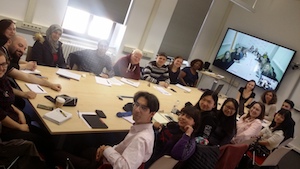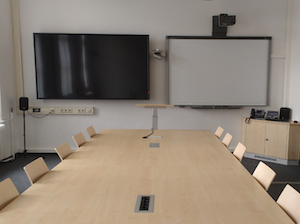The Two Cities Project
The Summer Semester of 2018 saw us launching the Two Cities Project – a teaching and research collaboration with Herzen State Pedagogical University of Saint Petersburg, Russia. Students enrolled in the MA English & American Studies programme at TU Chemnitz are undertaking their compulsory eLearning module alongside students enrolled at Herzen, with Prue Goredema, MBS and her Russian counterpart Dr Lidia Agafonova taking turns to teach both cohorts synchronously via video conference.
Some Specifications
We are using a Cisco TelePresence Codec C60 which delivers high definition video and exceptional audio quality for virtual collaboration. To maximise the quality of our interaction, we are using two PrecisionHD Cameras and multiple boundary layer microphones.
The enjoyment that emanates from holding court in an online environment is mere happenstance.
- Video conferencing and camera resolution up to 1080p
- Bandwidth for H.323/SIP up to 6 Mbps
- Video standards: H.261, H.263, H.263+ and H.264
- Audio standards: G.711, G.722, G.722.1,64 kbps & 128 kbps MPEG4 AAC-LD and AAC-LD Stereo
Aims
The aim of the project is for our students to evaluate the efficacy of various Web 2.0 tools widely used to develop language skills, foster higher order thinking, conduct assessments and promote learner engagement. Specific areas of focus include ascertaining the pedagogical value of each application (skills exercised, cognition and assessment); exploring the appeal of each application in terms of its effect on intrinsic motivation (autonomy, relatedness and competence); and reviewing usability factors such as interface, access and functionality.
For us, the benefits of blending face-to-face teaching with a virtual dimension are triune. Firstly, we are able to have our sixty-odd student-researchers participate in the preparatory lectures simultaneously, and we are able to collaborate on evaluation tasks and to relay our findings without delay. Finally, the opportunity to encounter students ensconced in a different learning culture is one that allows all participants, as budding language practitioners, to further develop their intercultural competence.
The preliminary findings from the project will be shared at the 14th ESSE Conference at Masaryk University, Brno, in the Czech Republic later this year.
A student’s perspective is shared here.


